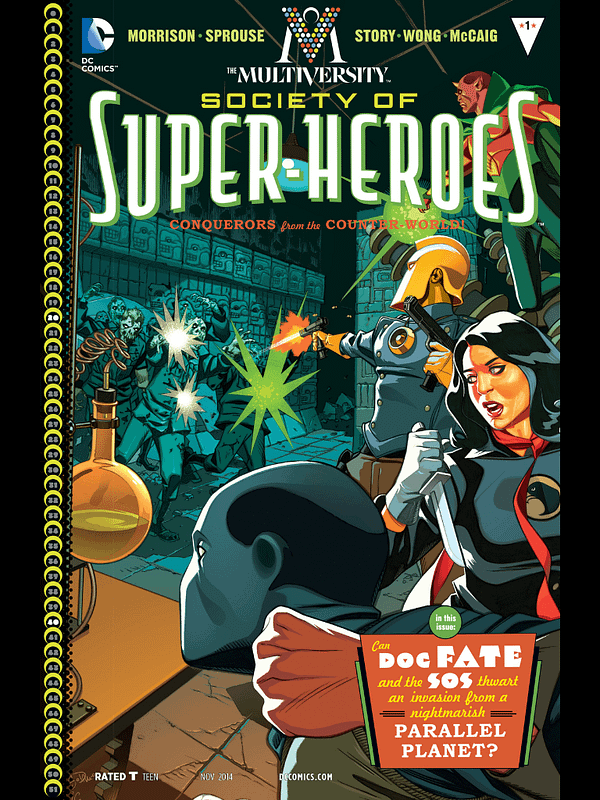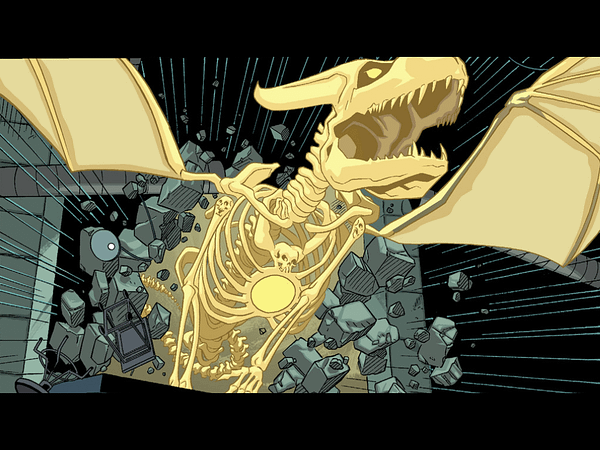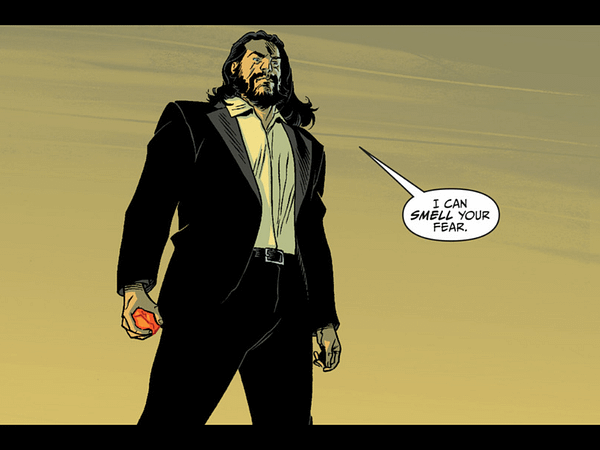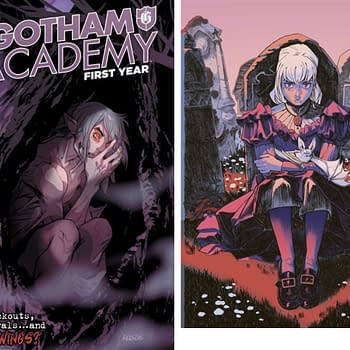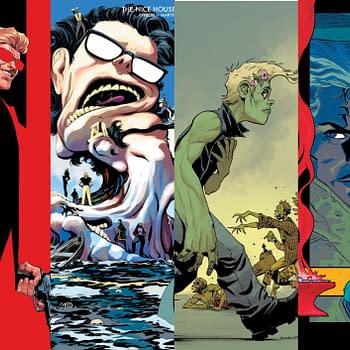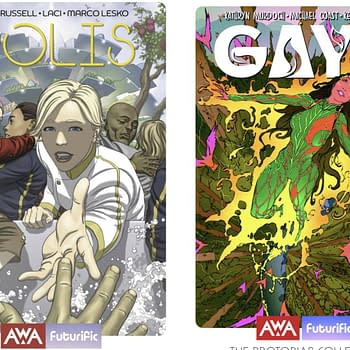Posted in: Comics, Recent Updates | Tagged: chris sprouse, Comics, dc comics, entertainment, grant morrison, Multiversity: Society of Superheroes
Punching Fear In Multiversity: Society of Superheroes
By Nas Hoosen
In my last post here at Bleeding Cool, I pointed out that superhero comic fans spend so much time reading between the lines of Grant Morrison's comics that we sometimes miss the best parts: the jokes. Considering how much the new issue of his metaseries, The Multiversity, got me thinking about fear, death and despair, feel free to look on my post as either more irony from a generation steeped in it, or gallows humor.
After all, after the relative upbeat superheroics of the first chapter of Multiversity, Society of Super-Heroes reads a little heavier. It may be set on hopeful, post-war Earth-20, but this comic quickly becomes a war story dealing with humanity's obsession with death and an existential threat to the readers themselves. The constant appearances by Ultra Comics in the background of other Earths isn't helping. It's only been two issues and already it feels like that haunted comic is stalking us, luring us into its web on the comic shelves in a few months' time. Its cover blurb has gone from something that made me laugh to a proper warning. Maybe we shouldn't read the damn thing. Just to be safe.
Despite my digs I'm a big fan of Grant Morrison's work. I take the man very seriously when he talks about confronting gods, spirits and other entities. Specifically, I love the way his comics operate on multiple levels, often providing as much an invitation to the narrative as they do an initiation into a headier lesson about existence. And while we're dealing with terrifying existential stuff here, keep in mind Captain Carrot's preference for happy endings in the previous chapter of this story. Couple that with the experience completing almost any of Morrison's best works and I anticipate we may achieve some catharsis from defeating all of Multiversity's Lovecraftian horrors down the line.
[*Lots of SPOILERS for Multiversity: Society of Super-Heroes Below…]
From the start, S.O.S. presents all the best elements of a story set on alternate earths, subverting our expectations of how the DC Universe should work or look with a few familiar signifiers that quickly swerve in surprising directions. Our narrator is Immortal Man, an existing character who here appears to be Earth-20's version of both Anthro and Vandal Savage. A more familiar version of Savage also appears here, hailing from Earth-40, which is Earth-20's evil opposite in the Multiverse. Chris Sprouse does an amazing job realizing the ancient villain here, just as he did in his chapter of the Morrison-scripted Return of Bruce Wayne a few years back.
A traditional wartime pulp adventure might see the heroes confront their enemies with a mastery of science, but Doc Fate's playing field is magic and so the story reflects that with numerous references to Eastern mysticism and mythology.
There are mentions of a fight against Ibn Al Ghul and his "Suicide Djinn", and in a story where Abin Sur also resembles the devil my brain immediately went off on a tangent to try and find a connection between all these possibly disparate references. As most people are aware, Green Lantern's powerset recalls the story of Aladdin, who commanded two djinn with a ring and a lamp, but his demonic appearance is also intriguing because in Islamic myth, Satan is also a djinn. I might just be another Morrison fan reading too much into things here but I just love the idea of the Devil arriving on Earth to warn a mystic that bad things from another world are on the way. Maybe the Devil's misunderstood after all.
On top of that we have Parallax referred to as a Makara, a dragon or chimera from Hindu myth, apparently used to symbolize self-sufficiency in some cases. That's exactly what it becomes a symbol of when Doc Fate and The Atom confront it and they begin to recount all their personal fears to themselves, as much as a means of cleansing and preparing themselves as a side effect of exposure to the beast, I suspect.
As Fate puts it, "It gives a face to your worst nightmare. When you see that face in front of you, punch it."
That makes for a useful lesson for the reader too, since we'll likely be called on to confront all our own fears to fight off The Gentry in Ultra Comics. If that isn't enough fun for you, the image of thousands of comics fans punching their copies of a comic should do the trick. But all this comic's talk of djinn, magic, devil worship and fear dragons only helps add to that haunted feeling I think this series is supposed to have, and that's what's most significant about it all to me.
If Final Crisis was concerned with how continuity forms organically in the void between a story's inception and its finale, Multiversity allows Grant Morrison to further consider the continuity that must exist between stories and their readers. In the first issue, Nix Uotan was a reader dissecting a comic, but in the story of Multiversity he's also a superhero on some worlds and a god on others. Just like all of us must surely be. There's a symbiosis at play here, but what is Morrison trying to say about it?
Well, consider the finale of this comic involves Savage and Immortal Man in a showdown on holy ground. We're told that only the death of an immortal can trigger Nix Uotan's arrival, but consider how layered his presence in this story is already. He's got the symbolic role of comic reader and reviewer, but also the superheroic and godlike role as Super-Judge, a name that perfectly sums up the attribute readers, reviewers and gods all have in common. Maybe there's something being said here about how much we readers love seeing these characters die for our own entertainment. After all, all characters in a superhero narrative are immortal warriors caught in a struggle between good and evil, and we creatures that live and die in our world apparently think we get to judge them for it too. Maybe there's a statement in here about how we're looking for a sense of finality in narratives that aren't meant to have endings, but are meant to be revised infinitely into new continuities and a multiversity of interpretations for each and every kind of reader.
The S.O.S. has been sent out. We know which heroes are going to receive it next. Any chance we have of saving the Multiverse we love is by showing up to the party to read between the lines and judge the results. Same as always, I guess.
